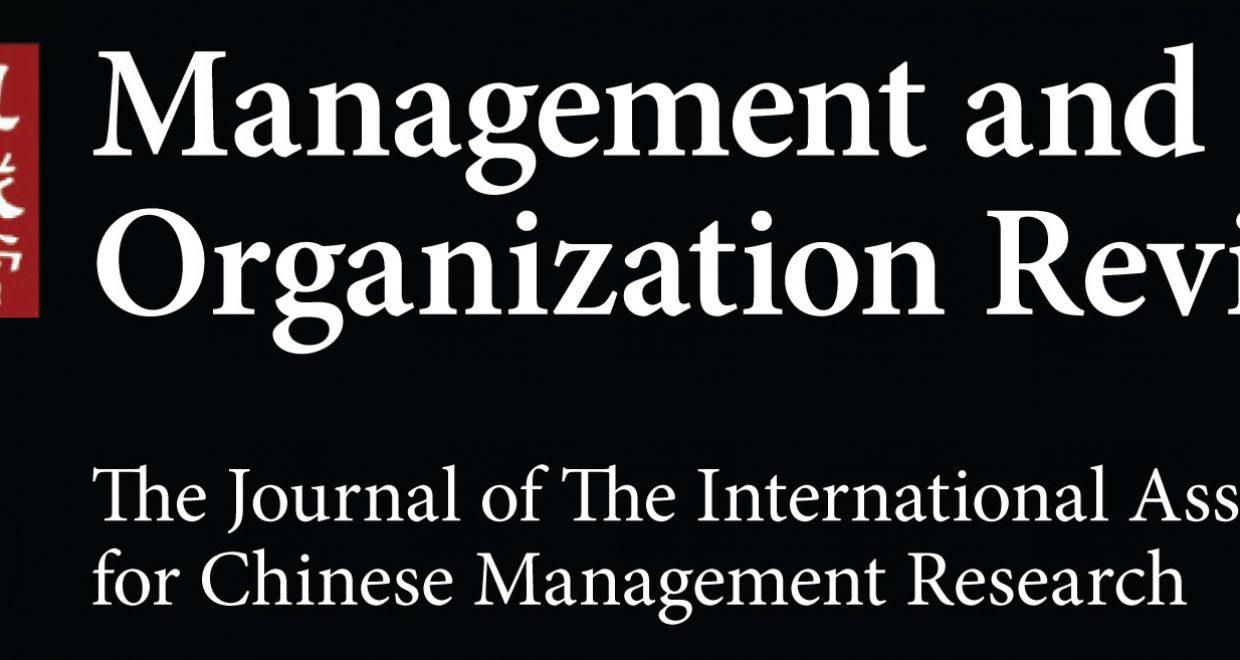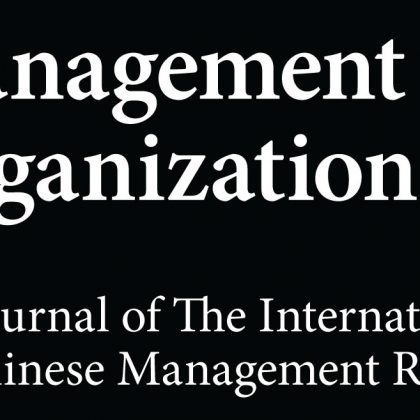An interview with the Editor-in-Chief of Management and Organization Review
Editor-in-Chief Arie Y. Lewin answers our questions…
Question: For those who may be new to the journal, what makes it stand out in the landscape of management journals?
Assuming the Editorship of MOR from Anne Tsui the founding editor is for me an honour, a privilege and a daunting challenge. Having been the founding editor of Organization Science, Editor of JIBS and 18 years as Director of the Center for International Business Education and Research at Duke University have reinforced my view that the great heterogeneity observed in the practice and theories of strategy, management, organizations, competitive advantage, is to a great extent affected by country founding conditions, history, culture and evolutionary journey from low to high endowment.
Question: You describe MOR as ‘The leading voice on management and organization in China and other emerging economies’ please can you be more specific about what you see as the main emerging economies?
I think of emerging economies as laboratories where managers, entrepreneurs, policy makers evolve new management and organization solutions reflecting their histories, culture and values and their national institutional configuration. MOR strongly believes in the legitimacy of advancing social science research underlying management scholarship, by welcoming rigorous contextual cultural research. Such insights can only enrich our understanding of the observed heterogeneity of management practice across countries. I have discussed this issue in my inaugural editorial (MOR 10.1). The quote below from this editorial, I believe, captures the fundamental idea about what I expect from a focus on emerging economies:
“Bounded rationality, satisficing, decomposing tasks to fit constraints of human information processing limitations, configuring organizations, and devising coordination and integration mechanisms are representative activities of any socioeconomic system, whether advanced or emerging. The fascinating theoretical and empirical challenge is to discover whether Chinese or other emerging economy managers devise and enact indiginous management solutions that are demonstrably different from managerial practices in developed economies as described in the vast extant body of management literature and managerial practice. In other words, do managers in emerging economies cope with consequences of bounded rationality by devising and implementing distinctly unique organization, structures, dynamic capabilities, management practices and routines?”
Question: The journal seeks provide a forum for discussion about indigenous management theories; please can you expand on this?
The dominant US business education model and dominant social science research paradigms largely ignore the reality that managers, business leaders, in other cultures are framing and implementing management and organization solutions to fundamental limitations of human bounded rationality first defined by Herbert Simon and the Carnegie School. Similarly much of the research in International business has focused the Multi National Enterprises. Very little research has focused on SMEs in emergent economies or on MNEs originating from emerging economies.
I expect that MOR will become an amalgamation of several leading journals in Management, Strategy, International Business, Sociology, Political Science, and Organization Behavior with a keen focus on the context of emerging economies. Several papers highlighting these phenomena are in process and are on track to appear in 2015 and subsequent years.
Question: Please can you tell us what we can expect from MOR in 2015?
As well as increasing frequency of publication to 4 issues, Volume 11 provides the first opportunity to glimpse the new editorial philosophy and direction of the journal. The first issue features a guest editorial by Dean Gerry George on the opportunity and importance to study management and organization dilemmas in the context of Africa. In Issue 2 MOR will redirect research on indigenous management by featuring a Perspective paper by Gordon Redding and Michael Witt and two commentaries. The issue will also feature the inaugural publication of one or more articles that are intended to legitimate Dialog, Discourse, and Debate. This editorial area is led by Professor Liisa Valikangas (Aalto University) whose editorial statement appears Volume 11.1.
It is also noteworthy that submissions to MOR have more than doubled since 2013 and that much of the increase is accounted for by western strategy and management scholars and by wider diversity of research topics.
Question: How will MOR realize your editorial vision and what developments can we expect from MOR in the future?
Realization of new editorial vision requires that MOR attract papers from multiple perspectives that encourage interconnectedness and an editorial team committed to finding the “jewel” in a paper and then guiding author(s) to develop and feature this jewel. Therefore, MOR has in place a new decentralized editorial structure consisting of 26 autonomous Senior Editors. The intention behind is to greatly increase the number of gatekeepers who attract, invite, and guide the review process of papers submitted to MOR and thereby increase the diversity of papers submitted and published in MOR. Senior Editors are empowered to define, cultivate, and attract submissions and develop their unique editorial domain of the journal. Therefore, the editorial decisions of Senior Editors are binding on the journal and cannot be overruled by the Editor-in-Chief. MOR has developed a reputation for its unique mentoring and developmental review process, the new MOR editorial team is committed to continue this practice. This commitment is being reinforced by limiting Senior Editors and their specific Editorial Review Board sub-group to handling a small number of manuscripts annually. The manuscript submission system has also been redesigned to maximize the match between the specific research focus of the submitted paper and the assignment of a Senior Editor and reviewers to the paper.
View the full Editorial Structure here.
As for your question what does the future hold?
Let me just note that following the successful inaugural MOR Research Frontiers Conference MOR is in process of organizing the second conference in 2016 as well as announce two special issues on topics that emerged during the inaugural research frontiers conference. The MOR Inaugural Research Frontiers Conference has also resulted in a follow up edited volume tentatively titled “Building Innovation Capacity in China: An Agenda for Averting the Middle Income Trap” which is on track to be released by Cambridge University Press in January 2016.






